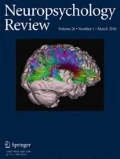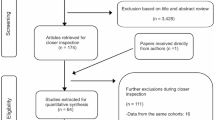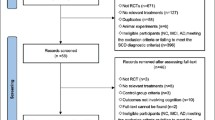Abstract
In subjective cognitive decline (SCD), older adults present with concerns about self-perceived cognitive decline but are found to have clinically normal function. However, a significant proportion of those adults are subsequently found to develop mild cognitive impairment, Alzheimer’s dementia or other neurocognitive disorder. In other cases, SCD may be associated with mood, personality, and physical health concerns. Regardless of etiology, adults with SCD may benefit from interventions that could enhance current function or slow incipient cognitive decline. The objective of this systematic review and meta-analysis, conducted in accordance with the PRISMA guidelines, is to examine the benefits of non-pharmacologic intervention (NPI) in persons with SCD. Inclusion criteria were studies of adults aged 55 + with SCD defined using published criteria, receiving NPI or any control condition, with cognitive, behavioural, or psychological outcomes in controlled trails. Published empirical studies were obtained through a standardized search of CINAHL Complete, Cochrane Central Register of Controlled Trials, MEDLINE with Full Text, PsycINFO, and PsycARTICLES, supplemented by a manual retrieval of relevant articles. Study quality and bias was determined using PEDro. Nine studies were included in the review and meta-analysis. A wide range of study quality was observed. Overall, a small effect size was found on cognitive outcomes, greater for cognitive versus other intervention types. The available evidence suggests that NPI may benefit current cognitive function in persons with SCD. Recommendations are provided to improve future trials of NPI in SCD.




Similar content being viewed by others

References
Note: citations marked with an asterisk (*) were those included in the meta-analysis
Alzheimer’s Association. (2016a). What is Alzheimer’s? Retrieved from http://www.alz.org/alzheimers_disease_what_is_alzheimers.asp.
Alzheimer’s Association. (2016b). Prevalence. Retrieved from http://www.alz.org/facts/#prevalence.
Alzheimer’s Disease International. (2015). World Alzheimer Report 2015: The Global Impact of Dementia. Retrieved from https://www.alz.co.uk/research/world-report-2015
Amariglio, R. E., Becker, J. A., Carmasin, J., Wadsworth, L. P., Lorius, N., Sullivan, C., et al. (2012). Subjective cognitive complaints and amyloid burden in cognitively normal older individuals. Neuropsychologia, 50, 2880–2886.
Andrewes, D. G., Kinsella, G., & Murphy, M. (1996). Using a memory handbook to improve everyday memory in community-dwelling older adults with memory complaints. Experimental Aging Research, 22, 305–322.
Bahar-Fuchs, A., Clare, L., & Woods, B. (2013). Cognitive training and cognitive rehabilitation for mild to moderate Alzheimer’s disease and vascular dementia (review). Cochrane Database of Systematic Reviews, 6(2013), CD003260.
*Barnes, D. E., Santos-Modesitt, W., Poelke, G., Kramer, A. F., Castro, C., Middleton, L. E., & Yaffe, K. (2013). The mental activity and EXercise (MAX) trial: A randomized controlled trial to enhance cognitive function in older adults. JAMA Internal Medicine, 173, 797–804.
Bond, M., Rogers, G., Peters, J., Anderson, R., Hoyle, M., Miners, A., et al. (2012). The effectiveness and cost-effectiveness of donepezil, galantamine, rivastigmine and memantine for the treatment of Alzheimer’s disease (review of technology appraisal no. 111): A systematic review and economic model. Health Technology Assessment, 16, 1–470.
Boone, K. B. (2009). Fixed belief in cognitive dysfunction despite normal neuropsychological scores: Neurocognitive hypochondriasis? The Clinical Neuropsychologist, 23, 1016–1036.
Campanella, S. (2013). Why it is time to develop the use of cognitive event-related potentials in the treatment of psychiatric diseases. Neuropsychiatric Disease and Treatment, 9, 1835–1845.
Canevelli, M., Adali, N., Tainturier, C., Bruno, G., Cesari, M., & Vellas, B. (2013). Cognitive interventions targeting subjective cognitive complaints. American Journal of Alzheimer's Disease and Other Dementias, 28, 560–567.
Cargin, J. W., Collie, A., Masters, C., & Maruff, P. (2008). The nature of cognitive complaints in healthy older adults with and without objective memory decline. Journal of Clinical and Experimental Neuropsychology, 30, 245–257.
Chambless, D., & Hollon, S. D. (1998). Defining empirically supported therapies. Journal of Consulting and Clinical Psychology, 66, 7–18.
Chambless, D. L., Baker, M. J., Baucom, D. H., Beutler, L. E., Calhoun, K. S., Crits-Christoph, P., et al. (1998). Update on empirically validated therapies, II. The Clinical Psychologist, 51, 3–16.
Clare, L., & Woods, R. T. (2004). Cognitive training and cognitive rehabilitation for people with early-stage Alzheimer’s disease: A review. Neuropsychological Rehabilitation, 14, 385–401.
Cohen, J. (1992). A power primer. Psychological Bulletin, 112, 155–159.
*Cohen-Mansfield, J., Cohen, R., Buettner, L., Eyal, N., Jakobovits, H., Rebok, G., Rotenberg-Shpigelman, S., & Sternberg, S. (2015). Interventions for older persons reporting memory difficulties: A randomized controlled pilot study. International Journal of Geriatric Psychiatry, 30, 478–486.
Comijs, H. C., Deeg, D. J. H., Dik, M. G., Twisk, J. W., & Jonker, C. (2002). Memory complaints: The association with psychoaffective and health problems and the role of personality characteristics: A 6-year follow-up study. Journal of Affective Disorders, 72, 157–164.
DaSilva, J., Gonçalves-Pereira, M., Xavier, M., & Mukaetova-Ladinska, E. B. (2013). Affective disorders and risk of developing dementia: Systematic review. British Journal of Psychiatry, 202, 177–186.
Davis, J. C., Bryan, S., Marra, C. A., Hsiung, G.-Y. R., & Liu-Ambrose, T. (2015). Challenges with cost-utility analyses of behavioral interventions among older adults at risk for dementia. British Journal of Sports Medicine, 49, 1343–1347.
Diniz, B. S., Butters, M. A., Albert, S. M., Dew, M. A., & Reynolds, C. F. (2013). Late-life depression and risk of vascular dementia and Alzheimer’s disease: Systematic review and meta-analysis of community-based cohort studies. British Journal of Psychiatry, 202, 329–335.
Duberstein, P. R., Chapman, B. P., Tindle, H. A., Sink, K. M., Bamonti, P., Jerant, A. F., & Franks, P. (2011). Personality and risk for Alzheimer's disease in adults 72 years of age and older: A six-year follow-up. Psychology and Aging, 26, 351–362.
Duff, K. (2012). Evidence-based indicators of neuropsychological change in the individual patient: Relevant concepts and methods. Archives of Clinical Neuropsychology, 27, 248–261.
*Fabre, C., Massé-Biron, J., Chamari, K., Varray, A., Mucci, P., & Préfaut, C. (1999). Evaluation of quality of life in elderly healthy subjects after aerobic and/or mental training. Archives of Gerontology and Geriatrics, 28, 9–22.
*Fairchild, J. K., & Scogin, F. R. (2010). Training to enhance adult memory (TEAM): An investigation of the effectiveness of a memory training program with older adults. Aging & Mental Health, 14, 364–373.
Fitzpatrick-Lewis, D., Warren, R., Ali, M. U., Sherifali, D., & Raina, P. (2015). Treatment for mild cognitive impairment: A systematic review and meta-analysis. CMAJ Open, 3, E419–E427.
Floyd, M., & Scogin, F. (1997). Effects of memory training on the subjective memory function and mental health of older adults: A meta-analysis. Psychology and Aging, 12, 150–161.
Frerichs, R. J., & Tuokko, H. A. (2005). A comparison of methods for measuring cognitive change in older adults. Archives of Clinical Neuropsychology, 20, 321–333.
Gates, N. J., & March, E. G. (2016). A Neuropsychologist’s guide to undertaking a systematic review for publication: Making the most of PRISMA guidelines. Neuropsychology Review, 26, 109–120. doi:10.1007/s11065-016-9318-0.
Greenwood, P. M., & Parasuraman, R. (2010). Neuronal and cognitive plasticity: A neurocognitive framework for ameliorating cognitive aging. Frontiers in Aging Neuroscience, 2, 150.
Gross, A. L., Parisi, J. M., Spira, A. P., Kueider, A. M., Ko, J. Y., Saczynski, J. S., Samus, Q. M., & Rebok, G. W. (2012). Memory training interventions for older adults: A meta-analysis. Aging & Mental Health, 16, 722–734.
Hampstead, B. M., Gillis, M. M., & Stringer, A. Y. (2013). Cognitive rehabilitation of memory for mild cognitive impairment: A methodological review and model for future research. Journal of the International Neuropsychological Society, 20, 1–17.
Hart, T., Tsaousides, T., Zanca, J. M., Whyte, J., Packel, A., Ferraro, M., & Dijkers, M. P. (2014). Toward a theory-driven classification of rehabilitation treatments. Archives of Physical Medicine and Rehabilitation, 95(Suppl 1), S33–S44.
*Hoogenhout, E. M., De Groot, R. H. M., van der Elst, W., & Jolles, J. (2012). Effects of a comprehensive educational group intervention in older women with cognitive complaints: A randomized controlled trial. Aging & Mental Health, 16, 135–144.
van Hooren, S. A., Valentijn, S. A., Bosma, H., Ponds, R. W., Van Boxtel, M. P., Levine, B., Robertson, I., & Jolles, J. (2007). Effect of a structured course involving goal management training in older adults: A randomised controlled trial. Patient Education and Counseling, 65, 205–213.
Imtiaz, B., Tolppanen, A.-M., Kivipelto, M., & Soininen, H. (2014). Future directions in Alzheimer’s disease from risk factors to prevention. Biochemical Pharmacology, 88, 661–670.
Jellinger, K. A., & Attems, J. (2013). Neuropathological approaches to cerebral aging and neuroplasticity. Dialogues in Clinical Neuroscience, 15, 29–43.
Jessen, F., Amariglio, R. E., van Boxtel, M., Breteler, M., Ceccaldi, M., Chételat, G., et al., the Subjective Cognitive Decline Initiative (SCD-I) Working Group. (2014). A conceptual framework for research on subjective cognitive decline in preclinical Alzheimer's disease. Alzheimer's & Dementia, 10, 844–852.
Jonker, C., Geerlings, M. I., & Schmand, B. (2000). Are memory complaints predictive for dementia? A review of clinical and population-based studies. International Journal of Geriatric Psychiatry, 15, 983–991.
Kliegel, M., & Zimprich, D. (2005). Predictors of cognitive complaints in older adults: A mixture regression approach. European Journal of Ageing, 2, 13–23.
*Kwok, T., Wong, A., Chan, G., Shiu, Y. Y., Lam, K. C., Young, D., Ho, D. W., & Ho, F. (2013). Effectiveness of cognitive training for Chinese elderly in Hong Kong. Clinical Interventions in Aging, 8, 213–219.
*Lautenschlager, N. T., Cox, K. L., Flicker, L., Foster, J. K., Van Bockxmeer, F. M., Xiao, J., Greenop, K. R., & Almeida, O. P. (2008). Effect of physical activity on cognitive function in older adults at risk for Alzheimer disease: A randomized trial. JAMA, 300, 1027–1037.
Low, L. F., Harrison, F., & Lackersteen, S. M. (2013). Does personality affect risk for dementia? A systematic review and meta-analysis. American Journal of Geriatric Psychiatry, 21, 713–728.
Maher, C. G., Sherrington, C., Herbert, R. D., Moseley, A. M., & Elkins, M. (2003). Reliability of the PEDro scale for rating quality of randomized controlled trials. Physical Therapy, 83, 713–721.
Meiberth, D., Scheef, L., Wolfsgruber, S., Boecker, H., Block, W., Träber, F., et al. (2015). Cortical thinning in individuals with subjective memory impairment. Journal of Alzheimer's Disease, 45, 139–146.
Metternich, B., Kosch, D., Kriston, L., Härter, M., & Hüll, M. (2010). The effects of nonpharmacological interventions on subjective memory complaints: A systematic review and meta-analysis. Psychotherapy and Psychosomatics, 79, 6–19.
Moher, D., Liberati, A., Tetzlaff, J., Altman, D., & the PRISMA Group. (2009). Preferred reporting items for systematic reviews and metaanalyses: The PRISMA statement. Annals of Internal Medicine, 151, 264–269. doi:10.7326/0003-4819-151-4-200908180-00135.
Molinuevo, J. L., Rabin, L. A., Amariglio, R., Buckley, R., Dubois, B., Ellis, K. A., R., … and the Subjective Cognitive Decline Initiative (SCD-I) Working Group. (2016). Implementation of subjective cognitive decline criteria in research studies. Alzheimer’s & Dementia. 10.1016/j.jalz.2016.09.012.
Nesselroade, J. R. (1991). Interindividual differences in intraindividual change. In L. M. Collins & J. L. Horn (Eds.), Best methods for the analysis of change (pp. 92–105). Washington, DC: American Psychological Association.
Ngandu, T., Lehtisalo, J., Solomon, A., Levälahti, E., Ahtiluoto, S., Antikainen, R., et al. (2015). A two-year multi-domain intervention of diet, exercise, cognitive training, and vascular risk monitoring versus control to prevent cognitive decline in at-risk elderly people (FINGER): A randomized controlled trial. The Lancet, 385, 2255–2263.
van Oijen, M., de Jong, F. J., Hofman, A., Koudstaal, P. J., & Breteler, M. M. (2007). Subjective memory complaints, education, and risk of Alzheimer's disease. Alzheimers Dement, 3, 92–97.
Perrotin, A., Mormino, E. C., Madison, C. M., Hayenga, A. O., & Jagust, W. J. (2012). Subjective cognition and amyloid deposition imaging: A Pittsburgh compound B positron emission tomography study in normal elderly individuals. Archives of Neurology, 69, 223–229.
Perrotin, A., de Flores, R., Lamberton, F., Poisnel, G., La Joie, R., de la Sayette, V., et al. (2015). Hippocampal subfield volumetry and 3D surface mapping in subjective cognitive decline. Journal of Alzheimer's Disease, 48(Suppl. 1), S141–S150.
Peter, J., Scheef, L., Abdulkadir, A., Boecker, H., Heneka, M., Wagner, M., et al., the Alzheimer’s Disease Neuroimaging Initiative. (2014). Gray matter atrophy pattern in elderly with subjective memory impairment. Alzheimer's & Dementia, 10, 99–108.
Pouryamout, L., Dams, J., Wasem, J., Dodel, R., & Neumann, A. (2012). Economic evaluation of treatment options in patients with Alzheimer’s disease: A systematic review of cost-effectiveness analyses. Drugs, 72, 789–802.
Rabin, L. A., Smart, C. M., Crane, P. K., Amariglio, R. E., Berman, R. F., Buckley, R. F., et al., the Subjective Cognitive Decline Initiative (SCD-I) Working Group. (2015). Subjective cognitive decline in older adults: An overview of self-report measures used across 19 international research studies. Journal of Alzheimer's Disease, 48(suppl. 1), S63–S86.
Rast, P., MacDonald, S. W. S., & Hofer, S. M. (2012). Intensive measurement designs for research on aging. GeroPsych (Bern), 25, 45–55.
Rebok, G. W., Ball, K., Guey, L. T., Jones, R. N., Kim, H.-Y., King, J. W., et al., for the ACTIVE Study Group. (2014). Ten-year effects of the advanced cognitive training for independent and vital elderly cognitive training trial on cognition and everyday functioning in older adults. Journal of the American Geriatrics Society, 62, 16–24. doi:10.1111/jgs.12607.
Saykin, A. J., Wishart, H. A., Rabin, L. A., Santulli, R. B., Flashman, L. A., West, J. D., McHugh, T. L., & Mamourian, A. C. (2006). Older adults with cognitive complaints show brain atrophy similar to that of amnestic MCI. Neurology, 67, 834–842.
Silliman, N. P. (1997). Hierarchical selection models with applications in meta-analysis. Journal of the American Statistical Association, 92, 926–936.
Sliwinski, M. (2008). Measurement burst designs for social health research. Social and Personality Psychology Compass, 2, 245–261.
*Smart, C. M., Segalowitz, S. J., Mulligan, B. P., Koudys, J., & Gawryluk, J. (2016). Mindfulness training for older adults with subjective cognitive decline: Results from a pilot randomized controlled trial. Journal of Alzheimer's Disease, 52, 757–774.
Snitz, B. E., Lopez, O. L., McDade, E., Becker, J. T., Cohen, A. D., Price, J. C., Mathis, C. A., & Klunk, W. E. (2015). Amyloid-beta imaging in older adults presenting to a memory clinic with subjective cognitive decline: A pilot study. Journal of Alzheimer's Disease, 48(Suppl. 1), S151–S159.
Sohlberg, M. M., & Mateer, C. A. (2001). Cognitive rehabilitation: An integrative neuropsychological approach. New York: Guilford.
Stern, Y. (2009). Cognitive reserve. Neuropsychologia, 47, 2015–2028.
Stern, Y. (2012). Cognitive reserve in ageing and Alzheimer’s disease. Lancet Neurology, 11, 1006–1012.
Tan, C.-C., Yu, J.-T., Wang, H.-F., & Tan, L. (2014). Efficacy and safety of donepezil, galantamine, rivastigmine, and memantine for the treatment of Alzheimer’s disease: A systematic review and meta-analysis. Journal of Alzheimer's Disease, 41, 615–631.
*Tsai, A. Y., Yang, M. J., Lan, C. F., & Chen, C. S. (2008). Evaluation of effect of cognitive intervention programs for the community-dwelling elderly with subjective memory complaints. International Journal of Geriatric Psychiatry, 23, 1172–1174.
de Waal, H., Stam, C. J., Lansbergen, M. M., Wieggers, R. L., Kamphuis, P. J., Scheltens, P., Maestú, F., & van Straaten, E. C. (2014). The effect of souvenaid on functional brain network organization in patients with mild Alzheimer’s disease: A randomized controlled study. PloS One, 9(1), e86558. doi:10.1371/journal.pone.0086558.
Wilson, K. Y. (2005). The effectiveness of memory training programs in improving the subjective memory characteristics of healthy older adults with memory complaints: A meta-analysis. Unpublished doctoral dissertation.
Winslow, B. T., Onysko, M. K., Stob, C. M., & Hazlewood, K. A. (2011). Treatment of Alzheimer disease. American Family Physician, 83, 1403–1412.
Acknowledgements
CMS was supported by the Alzheimer Society of Canada (Young Investigator Award #1216). CH was supported by a Salary Award (Chercheur-boursier, Senior) from the Fonds de Recherche du Québec–Santé. AT was supported by BRACE-Alzheimer’s Research (Registered Charity 297965). HH is supported by the AXA Research Fund, the Fondation Université Pierre et Marie Curie and the “Fondation pour la Recherche sur Alzheimer”, Paris, France. The research leading to these results has received funding from the program“Investissements d’avenir” ANR-10-IAIHU-06. The authors are grateful to Dr. Simone Lista for research assistance with completion of this study.
Author information
Authors and Affiliations
Consortia
Corresponding author
Ethics declarations
Conflict of Interest
The authors declare that they have no conflict of interest.
Ethical Approval
The referenced article Smart et al. (2016) was performed by the first author, and all procedures performed were in accordance with the ethical standards of the institution and with the 1964 Helsinki declaration and its later amendments or comparable ethical standards. Beyond this referenced article, the current article does not contain any studies with human participants performed by any of the authors.
Informed Consent
In the referenced article Smart et al. (2016), conducted by the first author, informed consent was obtained from all individual participants included in the study.
Electronic supplementary material
ESM 1
(DOCX 37.4 kb)
Rights and permissions
About this article
Cite this article
Smart, C.M., Karr, J.E., Areshenkoff, C.N. et al. Non-Pharmacologic Interventions for Older Adults with Subjective Cognitive Decline: Systematic Review, Meta-Analysis, and Preliminary Recommendations. Neuropsychol Rev 27, 245–257 (2017). https://doi.org/10.1007/s11065-017-9342-8
Received:
Accepted:
Published:
Issue Date:
DOI: https://doi.org/10.1007/s11065-017-9342-8



